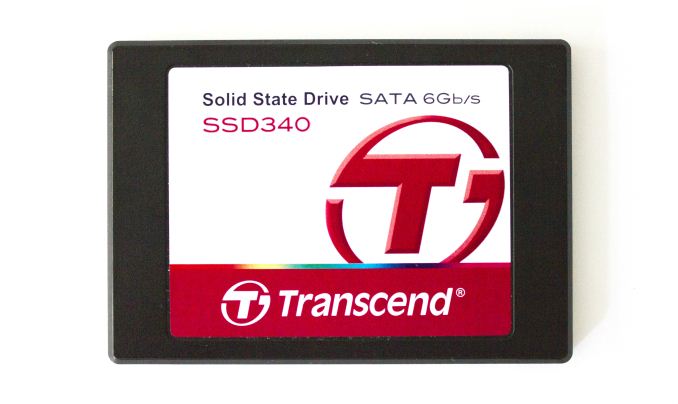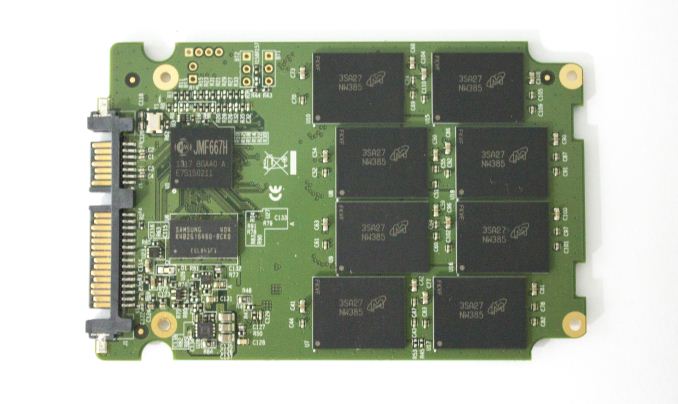Transcend SSD340 (256GB) Review
by Kristian Vättö on August 4, 2014 5:00 AM EST
A couple of months ago we reviewed JMicron's JMF667H reference design SSDs, which did relatively well in our tests especially when taking JMicron's previous SSD controllers into account. As always, reference designs are only meant for evaluation and do not make their way into retail, so today we are taking a look at Transcend's SSD340.
The SSD340 is based on the same JMF667H controller, although the firmware is an older version than what we tested in the reference design SSDs. Transcend told us that they currently have no plans to update the firmware to the newer version, which I am guessing is due to using customized firmware. It is actually quite rare that OEMs use the stock firmware as typically the OEMs request some changes and customizations, making it slower and more difficult to upgrade the firmware. I would not even be surprised if some OEMs did not upgrade the firmware to ensure product differentiation because it is obvious that OEMs do not want their low end drives to jeopardize the sales of higher cost (and profit) drives.
Update 8/18: Apparently Transcend has released a new firmware for the SSD340. I will try to find some time to test the new firmware and will provide an update if anything changes.
| Transcend SSD340 Specifications | ||||
| Capacity | 32GB | 64GB | 128GB | 256GB |
| Controller | JMicron JMF667H | |||
| NAND | Micron 128Gbit 20nm MLC | |||
| Sequential Read | 189MB/s | 364MB/s | 530MB/s | 518MB/s |
| Sequential Write | 37MB/s | 73MB/s | 145MB/s | 285MB/s |
| 4KB Random Read | 19K IOPS | 33K IOPS | 62K IOPS | 67K IOPS |
| 4KB Random Write | 9K IOPS | 17K IOPS | 35K IOPS | 68K IOPS |
| Idle Power | 0.53W | 0.53W | 0.54W | 0.55W |
| Load Power (Read/Write) | 1.08W / 1.14W | 1.41W / 1.33W | 1.52W / 1.98W | 1.63W / 3.75W |
| Endurance | 33TB | 66TB | 106TB | 141TB |
| Encryption | No | |||
| Warranty | Three years | |||
The SSD340 is available in capacities ranging from 32GB to 256GB. The JMF667H actually has a capacity limit of 256GB, which also limits the SSD340 to just 256GB. We should see JMF670H make its entry later this year with support for 512GB, but until then 256GB is the highest you can go with a JMicron controller.
Like nearly all client SSDs, the SSD340 has a three-year warranty with an endurance limitation. Quite surprisingly the endurance scales with capacity, although the scaling is not exactly linear. Nowadays most client SSDs only have a single rating for all capacities, so it is pleasant to see a scalable endurance for a change. I am pretty sure many OEMs just artificially lower the spec to make sure that enterprises customers do not choose the lower profit consumer drives, as the difference between high-end client and entry-level enterprise drives is quite indeterminate (i.e. entry-level enterprise drives are usually based on client platforms).
Transcend's data sheet for the SSD340 states that the drive supports DevSleep, although there are not any actual power figures listed aside from normal idle, which are way too high for DevSleep. Since the controller supports DevSleep, I have to wonder why Transcend has not published any power figures; we'll check power later on to verify whether the SSD340 actually supports DevSleep.
Transcend uses Micron's 128Gbit 20nm NAND in the SSD340. Our 256GB review sample had a total of sixteen NAND packages (eight on each side of the PCB), meaning that each package is a single-die package with one 128Gbit (16GB) die. There is also Samsung's 256MB DDR3-1600 DRAM chip working as a cache.
Test System
| CPU | Intel Core i5-2500K running at 3.3GHz (Turbo and EIST enabled) |
| Motherboard | AsRock Z68 Pro3 |
| Chipset | Intel Z68 |
| Chipset Drivers | Intel 9.1.1.1015 + Intel RST 10.2 |
| Memory | G.Skill RipjawsX DDR3-1600 4 x 8GB (9-9-9-24) |
| Video Card | Palit GeForce GTX 770 JetStream 2GB GDDR5 (1150MHz core clock; 3505MHz GDDR5 effective) |
| Video Drivers | NVIDIA GeForce 332.21 WHQL |
| Desktop Resolution | 1920 x 1080 |
| OS | Windows 7 x64 |
Thanks to G.Skill for the RipjawsX 32GB DDR3 DRAM kit











57 Comments
View All Comments
TonyCL6 - Wednesday, August 6, 2014 - link
SSD370 should be pretty much the same as AData SP610 because of the controller and NAND configuration.Per Hansson - Monday, August 4, 2014 - link
The more things change the more they stay the same seems a fitting quote for this Transcend's SSD endeavors!homerdog - Monday, August 4, 2014 - link
Unless these drives fall way down the price ladder, there simply no reason for them to exist.MadMan007 - Monday, August 4, 2014 - link
Is there any budget SSD that makes sense in a world where the MX100 exists?Samus - Monday, August 4, 2014 - link
This drive (and this company) is completely irrelevant. I don't get why anybody would buy a drive outside of the Crucial/Micron/Intel/Samsung/Toshiba/Sandisk circle.Kingston, ADATA, Transcend, OWC, Mushkin, Corsair, and so on, make no compelling products and can't compete with Sandisk/Crucial on price because they don't make their own memory, controllers, or both.
hojnikb - Tuesday, August 5, 2014 - link
Pretty much. Unless you're owning a fab it's pretty hard to compete price wise.TonyCL6 - Wednesday, August 6, 2014 - link
Frankly for consumer market, only Samsung and maybe Toshiba has its own SSD controllers. The rest are now mainly using Marvell solutions. Kingston, ADATA, Transcend, OWC, Mushkin, Corsair and so on help Micron(Intel) and Toshiba(Sandisk) a lot to support/ consume their NAND Flash capacity. If they all gone, I personally don't think that would do any good to end-users. You can easily tell from how Samsung sells TLC and VNAND products. The cost of NAND is way much cheaper but that never reflects on the selling price.l_d_allan - Tuesday, August 5, 2014 - link
As Butch Cassidy said, "Don't sugar-coat it" :-)StrangerGuy - Tuesday, August 5, 2014 - link
Anandtech should just probably come blunt and say "If you can't beat the MX100 in price/performance/reliability don't even THINK about selling consumer SSDs thank you very much"Readers that visit this site ain't fooled no matter how much ads or exposure that comes down our throats.
hojnikb - Tuesday, August 5, 2014 - link
But its true. Why buy a turd, if you can speds a few extra bucks and get a proper drive.